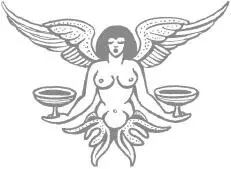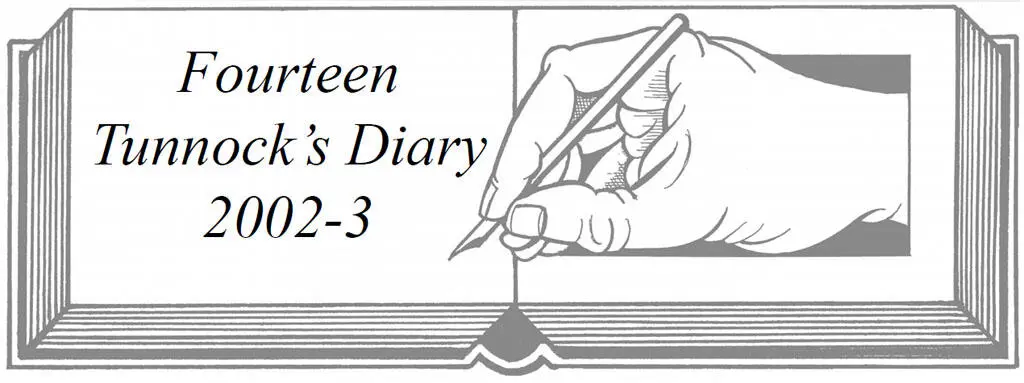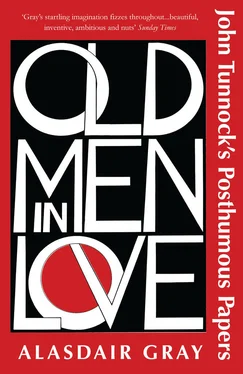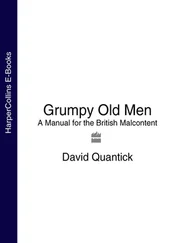It is queer how glibly I write speeches for folk whose language I do not know, and who painted wall pictures I have only seen in books, and were inspired by a Christianity in which I have no faith, in a land I have never visited. All of them are highly educated. How can I write convincing speeches for ordinary peasants, shopkeepers and craftsmen without going to Italy and learning the language?

13: ANGUS CALDER’S LETTER
17
Old Grindle’s Bookshop
Spittal Street, Tollcross
Edinburgh
2003
Dear John Tunnock Mate,
I call you Mate because that is a common English way of sounding friendly and I am English. Like you I am a middle-class Socialist of the Robert Owen-John Ruskin-William Morris kind, but would feel pretentious if I called you Comrade. Have just read your first chapters in Joy Hendry’s special edition of Chapman. Great stuff, Mate! I would not be saying this to a Glaswegian I have never met if I were not a bit drunk (Smith’s Glenlivet Malt) and moved almost to tears. I’ve read nothing so good since Alasdair Gray’s Lanark. Most writers are shy introverts with a very narrow experience of both public and private life, so learn about it by reading each other’s books. They usually compensate for this by inventing tougher, richer, sexier heroes than themselves. I ain’t referring to low-class fantasy heroes like Fleming’s James Bond but to historic figures worn like masks by better writers — Mary Renault’s Alexander the Great, Marguerite Yourcenar’s Hadrian, Graves’ Claudius and our own dear Alan Massie’s Roman emperors. Your Pericles and Alcibiades are more believable because you confront them with convincing common citizens like your farmer and sausage seller and show through them how the greed of the Athenian Empire led it to destruction. This is relevant to continual wars started in eastern oil-bearing nations by U.S. presidents and our own dear Tony Blair, on the pretext of defending justice and democracy. Congratulations!
But (I must be very ve-e-e-e-ry drunk to say this to a writer I have never met) how can you keep this level of relevance in a book ending with an eccentric Victorian clergyman? As your prologue says, his century was an age of industrial and social revolutions. What can an Anglican priest getting rich by fooling wealthier people tell us about the British Empire in India, Africa, Egypt? About women and children slaving 14 hours a day in mines and factories? About the fight to legalize trade unions and Cooperative Socialism? I don’t want Who Paid for All This? to end by showing as little of the 19 thcentury as Bertie Wooster’s antics in Blandings Castle show the 20 th. If it ends like that you had better call your book Money at Play.
Instead of provincial England why not show the Golden Age of a third famous city much the same size as Periclean Athens and Medician Florence? A city whose main citizens became intellectual world leaders? Why not use late 18 thcentury Edinburgh? It had Hume, founder of modern philosophy; Adam Smith, founder of political economy; Hutton, who made geology a modern science; Boswell who wrote the first modern biography. Burns, a world-famous poet, was its honoured guest. These and many others of slightly lesser genius all knew each other socially.
Mind you, mate, I’m not pretending Scotland in those days was all sweetness and light. The landowners and merchants of Edinburgh and Glasgow owned cotton and tobacco plantations in Florida, Virginia, Carolina, and sugar plantations in Jamaica, so used slaves as much as English merchants. Scottish coal miners, like Russian serfs, had been their employer’s property for a couple of centuries under laws making it a crime to help them escape, and sometimes had iron collars riveted round their necks. In England the parliamentary system was managed on behalf of the aristocracy and rich merchants by several magnates; in Scotland it was managed by one, Henry Dundas, nicknamed The Uncrowned King of Scotland, being most recent in a line of uncrowned kings appointed by the London government. Fewer Scottish householders were entitled to vote than Englishmen in the county of Suffolk, and as nobody got a government job in Scotland without Dundas approving, the law courts, the county and town councils were completely Tory. He enriched his family and friends, normal practice then as now, and of course blocked all attempts at political reform.
But you need someone remarkable whose life reveals this society. Why not James Watt, born in Greenock, maker of musical and scientific instruments who turned engineering into a science that transformed the world? He and his apprentice Murdoch (who invented gas lighting) and partner Matthew Bolton were members of the Birmingham Lunar Society. So was Josiah Wedgewood. Bolton and Wedgewood’s factories anticipated Henry Ford’s production lines. These men were political radicals who supported the American colonists’ fight for independence, and welcomed the French Revolution.
Or take Thomas Muir, who Dundas thought the most dangerous man in Scotland. Surely you know about Muir of Huntershill? The Glasgow stickit minister 18who became an Edinburgh advocate? And started Scottish Friends of the People Societies demanding political reform? And talked with leaders of the French National Assembly in Paris? And joined the Society of United Irishmen? And was tried in Edinburgh for lending Tom Paine’s Rights of Man to a weaver? Was transported to Botany Bay, then escaped from there in an American vessel with the connivance of George Washington? After shipwreck and sea battles he was received back in Paris with acclamations by the French National Assembly. He would have been president of the Scottish Republic had the proposed French invasion succeeded, did you know that? Why so many rhetorical questions? It’s the Glenlivet talking.
Your excellent Prologue says your teachers discouraged prrronouncing the r in worrrds to stop you sounding Scotch. Has your education made you, like the Scottish Labour Party, indifferent to the land where you live? Are you writing with an eye on London and its book reviewers? I am not, alas, a creative writer, just an English historian in Edinburgh. 19Historians, of course, enjoy escaping into the past as much as fiction writers. Many are like Ibsen’s Dr Tesman who spends his honeymoon studying cottage industries in medieval Brabant and ignoring his fascinating wife. In a humble way I have tried to emulate Herodotus, Xenophon and Marx instead of Tesman and show how the nation where I live has happened. I also know that some fiction writers have done it better. Scott and Tolstoy’s greatest work was set a few generations before their own time, but the kind of people and class conflicts they described were and are still contemporary.
I must be daft as well as drunk to criticize an author I’ve never met for something he has not yet written, but believe me mate, your first chapters have enthused (oh God I hate that word but cannae think of another yes I can) have inspired me to this insolent diatribe.
I am, believe me,
my dear dear sir and mate,
your apologetic,
humble,
and very urgent well-wisher,
Angus Calder
FOURTEEN TUNNOCK'S DIARY 2002-3

Damn Angus Calder. Through Joy Hendry’s Chapman the greatest encouragement I ever received ends by demanding that I abandon years of research and invent a new ending to my masterpiece. Had a Scottish Enlightenment setting occurred to me twenty years back I might have used it but I CANNOT now~fling aside years of research and undertake more. How can I possibly write well about life in Edinburgh around 1780 — 90 when I hardly know Glasgow in 2003 though surrounded all my life by detailed information about it? I could write nothing after reading that letter yesterday and went for a meditative stroll that ended in another bad shock.
Читать дальше














